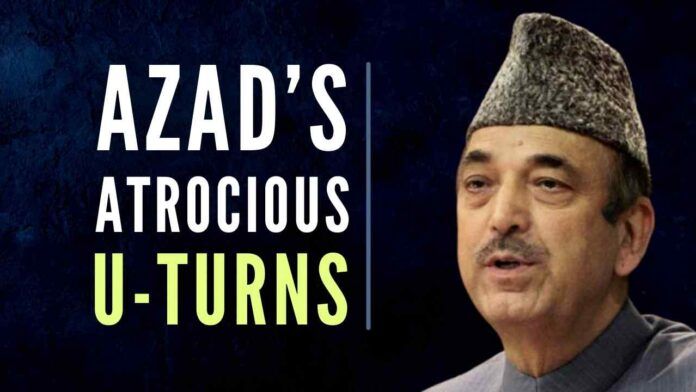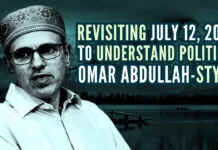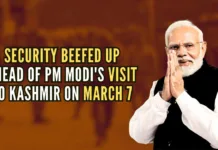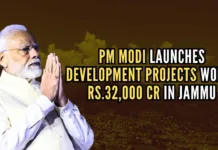
Congress leader Azad’s false claim
Former J&K CM and senior Congress leader Ghulam Nabi Bhat alias Azad consistently claims that he is not an ethnic Kashmiri and that he hails from the erstwhile Doda district of Jammu province. His claim is false. His ancestors were ethnic Kashmiris from the Kulgam area and some of them migrated to Doda several decades ago. He is an ethnic Kashmiri. He is rabidly anti-Jammu. His heart bleeds only for his co-religionists in Kashmir.
One can refer to umpteen instances to establish that his single-point agenda all along has been to strengthen Kashmiri Muslim hegemony and domination over the state polity by jeopardizing the legitimate interests and rights of the people of Jammu province, who lost everything in 1947. That year, Maharaja Hari Singh acceded his J&K State to India and Indian PM J L Nehru ditched the nation and Jammu and transferred the state power from Jammu to the separatist Abdullahs of Kashmir using dubious means.
The Dogras of Jammu had been at the helm of affairs in the state between March 1846, when Maharaja Gulab Singh of Jammu founded J&K State, and October 1947, when the Imperialist Britons transferred power to the Congress they themselves established on December 28, 1885, at Bombay to defeat the then ongoing independence movement in India and further destroy our country socially, religiously, culturally, economically and politically.
As said, one can cite innumerable instances to call the bluff of Ghulam Nabi Azad and establish that he was, and is, biased against the people of Jammu province. A reference here to just four instances would be enough to expose the anti-Jammu credentials of Ghulam Nabi Azad. First, a reflection on what he said about the J&K Delimitation Commission in Doda on December 20, 2021, and his two atrocious U-turns on the same issue on December 26 and December 30.
What did he say on December 20?
Among other things, he said: “For any delimitation exercise apart from the population, the area is an equally important parameter. There are three regions in Jammu Division including Chenab, Pir Panjal, and the Central region including Jammu-Udhampur and Kathua parts. There are several constituencies having areas ranging from 4000 sq km to 6000 sq km. There is no need to increase constituencies in major cities but many rural and remote areas of the Chenab belt besides the Pir Panjal region, and Udhampur-Kathua districts which are large in the area need justice. The Scheduled Castes (SC) category has already been provided reservation in the Legislative Assembly and Scheduled Tribes (ST) are being accorded which is a good move. But as far as the question of Assembly seats is concerned, justice should be accorded to the rural and remote areas of the region including Chenab and Pir Panjal belts besides Kathua-Udhampur. Delimitation Commission would bind up its exercise shortly doing justice to these areas”[1].
The same day, the new J&K Delimitation Commission had proposed 43 seats for Jammu, as against 37 it hitherto had in the 87-member Assembly, and 47 for Kashmir, as against 46 seats it had since 1995. These 90 seats included seven seats reserved for the SCs as before (all in Jammu province) and nine seats reserved for the STs for the first time with Jammu reportedly getting five seats and Kashmir four. Besides, these 90 seats also included the additional seven seats six of which were allotted to Jammu province, which is two-time that of Kashmir in terms of land area and has a population equal to Kashmir, if not more, and one additional seat to Kashmir. All Kashmiri politicians, without any exception, rejected the Delimitation proposal as biased, anti-Kashmiri Muslims and as an attack on the so-called Idea of secular India, a threat to the “secular fabric” of the country and a threat to harmony in J&K.
The December 20 statements of Ghulam Nabi Azad were welcomed by many in Jammu, notwithstanding the fact that he trifurcated Jammu province into the non-existent Chenab Valley, the non-existent Pir Panjal Valley, and Central region consisting of Jammu, Udhampur, and Kathua districts.
However, it was on December 26 that Ghulam Nabi showed his real face. That day, he dodged the controversy over the Delimitation Commission’s draft report when asked if he endorsed the Kashmiri stand on it as well as allotment of six additional seats to Jammu and one to Kashmir. As a matter of fact, he did an atrocious U-turn and said: “We consider J&K as a State and whether the seats are given here (Jammu) or there (Kashmir), we should talk in terms of the whole of J&K State, irrespective of regions…For me, Jammu and Kashmir are one, and so, I cannot take side for one or the other region”. He took the U-turn at Udhampur.
As if all this was not enough to hurt the people of Jammu province, he on December 30 went a step further to establish that he has no regard whatsoever for the aspirations of the long-suffering people of Jammu province. In effect, he demanded at least three more seats for Kashmir. “(Seven) Seats reserved for SCs should be distributed equally between Jammu and Kashmir regions”. He put forth the demand ignoring the fact that hardly any member of any SC community lives anywhere in Kashmir and that Jammu alone houses all the SC communities.
Earlier in 2007, Ghulam Nabi Azad as J&K CM had also worked hard to increase the number of seats for Kashmir in the Assembly but failed. His government had proposed a 25% increase in the number of seats both in Jammu province and Kashmir. Had he succeeded, the number of seats for Kashmir would have gone up to 58 and that of Jammu to 46. In other words, he would have increased the difference in the number of seats between Jammu province and Kashmir from nine in 1995 to twelve in 2007. The same year, however, he succeeded in hurting Jammu by creating four new districts in Kashmir, as against one recommended by the Wazir Commission, and four in Jammu, as against three recommended by the said Commission.
All this should only serve to demonstrate the extent to which Ghulam Nabi Azad is biased towards Jammu and biased in favour of Kashmiri Muslims. One thing is absolutely clear: If Jammu is to get its due share in the polity, maintain and preserve its self-respect and lead a dignified life, it must get the statehood status. Such a reform alone could strengthen the nationalistic Jammu and further break the backbone of the Kashmir jihad. It’s hoped that the Narendra Modi Government would rise to the occasion and bifurcate UT of J&K to create a separate Jammu State.
Note:
1. Text in Blue points to additional data on the topic.
2. The views expressed here are those of the author and do not necessarily represent or reflect the views of PGurus.
Reference:
[1] Addl 6 Assembly seats be provided to Chenab belt, Pir Panjal, Kathua-Udh: Azad – Dec 21, 2021, Daily Excelsior
PGurus is now on Telegram. Click here to join our channel and stay updated with all the latest news and views
For all the latest updates, download PGurus App.
- ‘Kashmir My core constituency’: Revisiting July 12, 2003 to understand politics, Omar Abdullah-style - March 15, 2024
- Total deviation from traditional approach: Seven takeaways from PM Modi’s March 7 Srinagar visit - March 9, 2024
- Status of political parties: Why is further J&K reorganization imperative? - March 1, 2024











It is very worrying that the Central Government has not recognised these hypocrites and Jihadis and are moving ahead with Delimitation based on the the fraudulent census of 2011 and treating Jammu as a hostage state for the Kashmiri Muslims. The Nehru/Abdullah fraud is going on with full swing and the anti-nationals are being pandered to. None of the corrupts have been taken to task or made accountable despite the ” Na khaunga Na kha promise.ney dunga” The likes of Mr Ankur Sharma must be supported and listened to if Bharat is to be saved from Ghazwa e Hind.Jammu MUST be given independent Statehood and the Kasmiri Hindu genocide recognised as a genocide. Mufti/Abdullahs must be banned from any public office and brought to justice.
In the wake of the abrogation of 370 & 35A and now coming of the delimitation, the fear of loss of power for good is obvious. Having ethnically cleansed the valley to ensure a control in perpetuity, the Gupkar gang is worried that they could very well be held to account once out of power without the protection of 370 &35A. The three robbing combinations of Kashmir never even considered to look into the crimes committed during the successful ethnic purge.